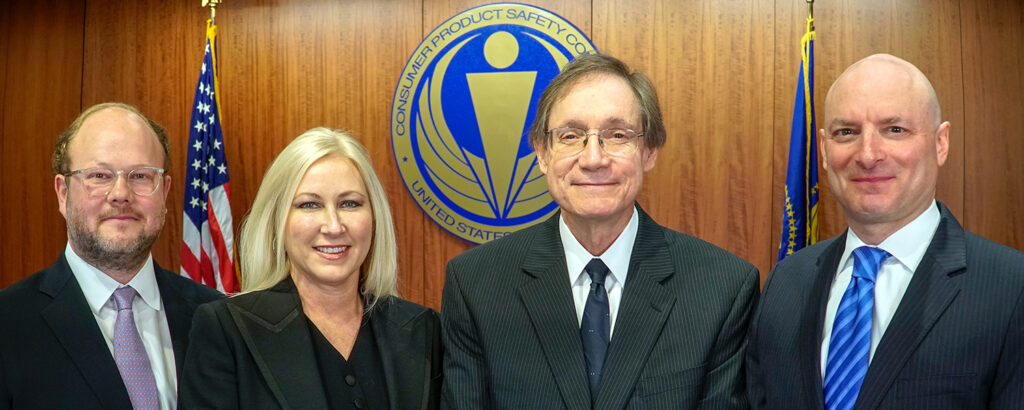
( ENSPIRE Features ) CPSC Addresses the Surge of Tornadoes by Issuing Life-Saving Tips
ENSPIRE Contributor: Wesley Tran
The U.S. Consumer Product Safety Commission (CPSC) is aware of the devastation caused by the deadly tornadoes that swept through multiple states over the weekend. With another round of severe weather, including possible tornadoes, threatening multiple states this week, CPSC is urging consumers to take steps to protect themselves and their families against carbon monoxide (CO) poisoning and fires.
The U.S. Consumer Product Safety Commission (CPSC) is charged with protecting the public from unreasonable risk of injury or death associated with the use of thousands of types of consumer products. Deaths, injuries, and property damage from consumer product-related incidents cost the nation more than $1 trillion annually. The CPSC’s work to ensure the safety of consumer products has contributed to a decline in the rate of injuries associated with consumer products over the past 50 years and today they are sharing tips to keep in mind in case of an emergency.

In the case of a storm, consumers need to be especially careful after the storm knocks out electrical power. Portable generators create a risk of CO poisoning that can kill in minutes. CO is called the invisible killer because it is colorless and odorless. Exposed persons may become unconscious before experiencing CO-poisoning symptoms of nausea, dizziness, or weakness, which can lead to death.
An average of 85 consumers die in the U.S. yearly from CO poisoning from portable generators. A recent CPSC report, Fatal Incidents Associated with Non-Fire Carbon Monoxide Poisoning from Engine-Driven Generators and Other Engine-Driven Tools 2011-2021, shows that African Americans are at higher risk, accounting for 23 percent of generator-related CO deaths, nearly double their estimated 12 percent share of the U.S. population in that time frame.
In the case of a power outage, follow these important life-saving tips:
- NEVER operate a portable generator inside a home, garage, basement, crawlspace, or shed. Opening doors or windows will not provide enough ventilation to prevent the buildup of lethal levels of CO.
- Operate portable generators outside only, at least 20 feet away from the house, and direct the generator’s exhaust away from the home and any other buildings that someone could enter, while keeping windows and other openings closed in the path of the generator’s exhaust. Do not operate a generator on an outside porch or in a carport. They are too close to the home.
- Check that portable generators have been maintained properly, and read and follow the labels, instructions, and warnings on the generator and in the owner’s manual.
- Look for portable generators that have a CO shut-off safety feature, which is designed to shut the generator off automatically when high levels of CO are present around the generator. These models may be advertised as certified to the latest safety standards for portable generators–PGMA G300-2018 and UL 2201–which are estimated to reduce deaths from CO poisoning by 87% and 100%, respectively. UL 2201 certified models have reduced CO emissions besides the CO shut-off feature.
Check CO and Smoke Alarms
- Working smoke and CO alarms save lives! Install battery-operated CO alarms or CO alarms with battery backup on each level and outside separate sleeping areas at home. Interconnected CO alarms are best; when one sounds, they all sound.
- Ensure smoke alarms are installed on every level and inside each bedroom at home.
- Test CO and smoke alarms monthly to ensure they are working properly, and replace batteries, if needed. Never ignore an alarm when it sounds. Get outside immediately and call 911.
Dangers of Portable Heaters
- Keep all sides of the portable heater at least 3 feet from beds, clothes, curtains, papers, sofas, and other items that can catch fire.
- ALWAYS use a wall outlet; NEVER a power strip and NEVER run the heater’s cord under rugs or carpeting.
- Make sure the heater is not near water. NEVER touch it if you are wet.
- Place the heater on a stable, level surface, located where it will not be knocked over.
- NEVER leave running unattended in a confined space to reduce hyperthermia hazards.
- If the heater’s cord or plug is HOT, disconnect the heater and contact an authorized repair person. If any part of the outlet is hot, contact a certified electrician.
Dangers with Charcoal and Candles
- NEVER use charcoal indoors. Burning charcoal in an enclosed space can produce lethal levels of CO. Do not cook on a charcoal grill in a garage, even with the door open.
- Use caution when burning candles. Use flashlights or battery-operated candles instead. If using candles, do not burn them on or near anything that can catch fire. Never leave burning candles unattended. Extinguish candles when leaving the room and before sleeping.
Dangers with Gas Leaks:
- If you smell or hear gas leaking, leave your home immediately and contact local gas authorities from outside the home. Do not operate any electronics, such as lights or phones, before leaving.
In this time of tragedy, be sure to support anyone you know who may need help to get back on their feet. Remember to stay informed, be prepared, and stay safe!
For additional resources, check out these links:
Poster – Carbon Monoxide (CO) the Invisible Killer
Poster – Carbon Monoxide (CO) the Invisible Killer (Spanish)
Carbon Monoxide Safety Center (Spanish)
Link to broadcast quality video for media:
Tornado Safety b-roll: https://spaces.hightail.com/space/oy0kSjsyzz
CPSC spokespeople are available for interviews. Email nnye@cpsc.gov or call 240-204-4410 to arrange an interview.
*Annual average for the number of reported fatal non-fire CO exposure deaths associated with generators each year from 2017-2019, the last three years of complete data in CPSC’s report (2011-2021). (Report/Table 3)
Individual Commissioners may have statements related to this topic. Please visit www.cpsc.gov/commissioners to search for statements related to this or other topics.
For more about the CPSC:
Visit their website, Facebook, Instagram, and Twitter, and sign up for their email alerts. Report a dangerous product or a product-related injury on www.SaferProducts.gov. Call CPSC’s Hotline at 800-638-2772 (TTY 301-595-7054) or contact a media specialist.
Related Articles: Trae Tha Truth Helping Houstonians Survive Inclement Weather, Victoria Buggs Launched CPR Center for Health and Safety Professionals





